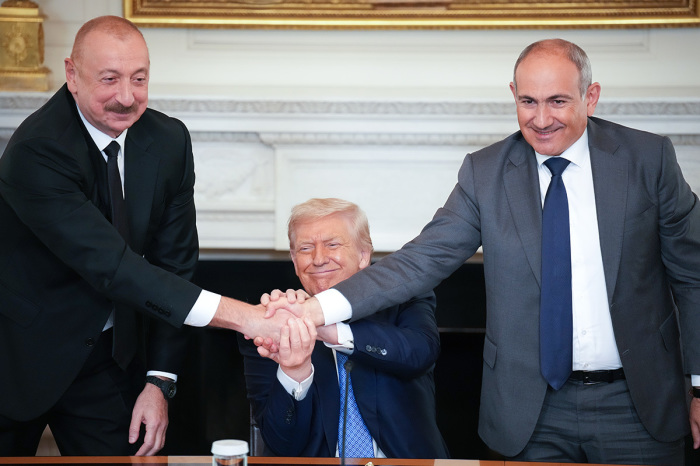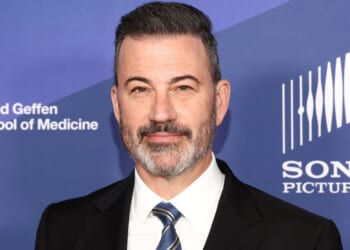
President Donald Trump and leaders from Armenia and Azerbaijan celebrated the signing of a peace deal aimed at ending decades of conflict, which the Armenian National Committee of America accused of rewarding Azerbaijan’s ethnic cleansing of Armenians in Nagorno-Karabakh.
Trump hosted Azerbaijan’s President Ilham Aliyev and Armenian Prime Minister Nikol Pashinyan at the White House on Friday for a peace summit, where the two countries in the South Caucasus signed agreements with each other and the United States.
As part of the deal, Armenia, which is believed to be the first Christian nation dating back to 301 A.D., has agreed to allow a transit corridor through its territory, named the “Trump Route for International Peace and Prosperity.” The U.S. will develop the route, connecting Azerbaijan and the Nakhchivan exclave, which are separated by a 20-mile-wide patch of Armenian territory. The corridor will operate under Armenian law.
Trump said during the summit that he didn’t come up with the idea to name the route after him, but noted that it was “a great honor for [him].”
“For more than 35 years, Armenia and Azerbaijan have fought a bitter conflict that resulted in tremendous suffering. … Many tried to find a resolution … and they were unsuccessful,” the U.S. president stated. “With this accord, we’ve finally succeeded in making peace.”
Prime Minister Pashinyan, who hailed the agreement as a “significant milestone” in Armenian-Azerbaijani relations, expressed gratitude to Trump for his personal engagement and “resolute commitment to peace,” which Pashinyan said made the agreement possible.
“We are laying a foundation to write a better story than the one we had in the past,” the Armenian prime minister said.
Aliyev said the agreement means that Azerbaijan “can now turn the page of standoff, confrontation, and bloodshed, and provide a bright and safe future for our children.” Aliyev also thanked Trump, saying that Azerbaijan will remember the day of the signing with a “feeling of pride and gratitude to President Trump.”
The two countries have long been in conflict with one another, dating back to the 1980s when the mostly ethnic-Armenian Nagorno-Karabakh, also known as Artsakh, broke away from Muslim-majority Azerbaijan.
Religious freedom advocates have repeatedly raised concerns about the displacement of over 120,000 Armenians from their ancestral homeland of Artsakh. The Azerbaijan military expelled the Armenians during a September 2023 offensive.
Azerbaijan also imposed a blockade of Nagorno-Karabakh that lasted from December 2022 to September 2023, raising concerns over a genocide by starvation.
In response to the recent peace deal, U.S. Secretary of State Marco Rubio said Friday that the U.S. has brought the leaders of Azerbaijan and Armenia together “to reach a peace deal that will end decades of conflict.”
“This historic deal will make the region stronger and open new doors for American trade and investment. We congratulate both countries on a new era of peace,” Rubio said.
The Armenian National Committee of America expressed skepticism about the agreement the day before the summit. ANCA argued that the deal will compromise Armenia’s national security and reward Azerbaijan’s acts of genocide.
“The same Donald Trump who failed to stop Azerbaijan’s 2020 attack on Nagorno Karabakh is now rewarding this very aggression — further compromising Armenia’s security and sovereignty and, in the process, abetting Azerbaijan’s normalization and formalization of its ethnic cleansing, its genocide, of more than 150,000 indigenous Armenian Christians,” ANCA Executive Director Aram Hamparian said in a Thursday statement.
“Real peace cannot be built on the forced displacement of a people, the abandonment of hostages, or the roll-back of sovereignty,” Hamparian added. “You can’t declare peace while ignoring the ethnic cleansing of 150,000 Armenians and the illegal imprisonment of their democratically elected leaders. That’s not peace — it’s impunity, an invitation to renewed aggression.”
The founding co-chair of the Congressional Armenian Caucus, Rep. Frank Pallone, D-N.J., said in a Friday statement that he feels “encouraged” by the U.S. involving itself in efforts to establish peace between Armenia and Azerbaijan.
Any agreement, Pallone said, must include “solid enforcement mechanisms” and “security guarantees” for Armenia in case Azerbaijan goes back on its word.
The lawmaker argued that it was a mistake for the Trump administration to waive Section 907 of the United States Freedom Support Act, which prohibited the U.S. government from providing direct assistance to Azerbaijan.
“There is no need to provide Azerbaijan with military assistance,” Pallone asserted, adding that more should be done to push Azerbaijan’s president to release political prisoners and prisoners of war held in Baku.
The representative also insisted that Aliyev should remove his troops from Armenian land.
“The United States has a moral imperative to ensure the safe, dignified and sustainable return for displaced Armenians to their indigenous homeland of Nagorno-Karabakh,” he added.
Matias Perttula, director of the U.S.-based advocacy organization Save Armenia, called the summit a “great step toward peace.”
“Kudos to @POTUS and his admin on getting things done,” Perttula wrote on social media. “We must not forget the Armenian POWs and the right of return of all Armenian refugees from Nagorno-Karabakh!”
Samantha Kamman is a reporter for The Christian Post. She can be reached at: samantha.kamman@christianpost.com. Follow her on Twitter: @Samantha_Kamman

















